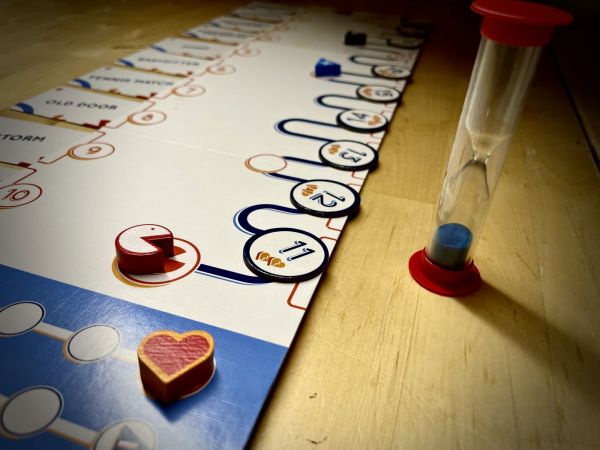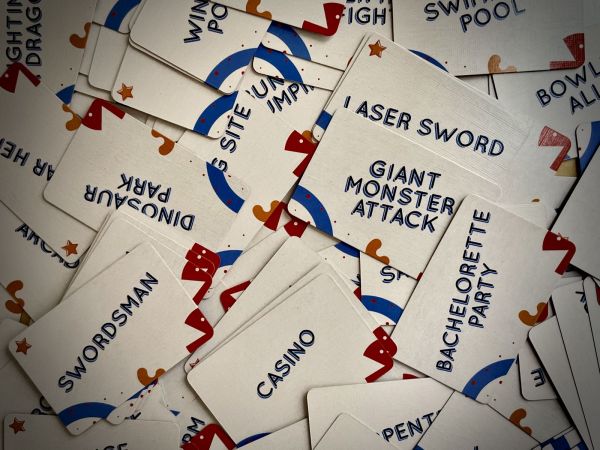Identify Sounds Among the Chaos in Cooperative Party Game Sound Box

Are you ready for chaos and madness in the ultimate noise extravaganza? Think Sound Box! At each turn, Soundmakers will mimic sounds from concept cards, and then the Guesser will try to associate the sounds with the concept cards on the board.
Sound Box is a funny cooperative party game for 4-7 players that will challenge your deductive skills. Once the time is over, the Guesser must pick the right cards from the Sound Box, identifying the right concepts to advance the game toward a cooperative victory. Instead, make a wrong guess, and the team will lose life points.
A Playtest Print & Play version of the game can be found here.

Gameplay
The game takes place around the main board; the board lays out several concept cards, a progress tracker, and a life points tracker. In each round, there will be a Guesser, a Recorder, and Soundmakers, rotating clockwise. After studying the Soundtrack concept cards, you blindfold both the Guesser and the Recorder with "funky" blinding eyeglasses.
Every Soundmaker draws a number token from a bag to discover the concept sound they must imitate. All Soundmakers make their sounds simultaneously during 13 seconds of noise and chaos, while the Guesser and the Recorder listen and try to memorize what they hear. When the timer runs out, the Guesser removes the eyeglasses and tries to find as many sound concept cards as possible, one at a time. While blindfolded, the Recorder supports the Guesser by repeating the sounds he recalls. If the Guesser makes a mistake, the round ends immediately.
Each correct guess gives the group one point, but beware: the group loses life depending on "unguessed" numbered tokens. Team members win if they gain enough points to reach the end of the Soundtrack. If the group loses all life points, all players lose.

Review
The game introduces a mix of exciting light mechanics to keep it engaging.
When the game starts, the board will have ten concept cards available. As the team progresses, new card slots open, and up to twenty concept cards can be on the board by the end of the game. This simple concept makes the game harder and harder as it progresses.
In addition, you do not discard all cards between turns. You keep all unguessed cards on the board between rounds, replace the discarded ones, and introduce new cards to the game if new card slots are opened. It's a straightforward mechanism, but it prevents the game from becoming overwhelming. Players familiarize themselves with the remaining concept cards while playing instead of learning and memorizing a complete set of new cards for every round, which would be extremely difficult.
Double sound tokens force the team to choose a player to make sounds for two concept cards instead of one; this adds variety to the gameplay and an extra challenge.
Desired uncertainty comes from the random cards placed on the board and the token number (the cards you imitate). Some sounds are more complex than others, but overall it is a well-balanced game. By sharing a common pool of concept cards available and by being a cooperative game, the element of "being lucky" is transient. Sometimes the concepts to be "mimicked" will be difficult; other times, they will be easier. And that's where the funny side of the game shines. I would not consider this a lucky game. Still, some randomness is welcome to add replayability to the game. Ultimately, it all comes down to the team's Performance Contingency. Suppose there is no luck, and suppose you have a sharp memory, an excellent auditory memory, and are clever at word association games. In that case, you will have a significant advantage when playing this game.
Fictional Involvement is a strong point in this game. All players gather around the board (which I like to term the "Sound Box"). It is supposed to be a game of deduction while making noises, and it delivers. As it is a party game, there is no narrative involvement. But, It is meant to be abstract and fun, and it achieves this successfully.
Setup time and complexity are minimal, and a thirteen-second timer measures downtime. I'm not particularly eager to term this a Gateway Game, because it does not introduce advanced game mechanics to those new to the hobby. However, it is an excellent filler game to pass your time with your friends, have funny moments, and make a lot of noise and mayhem!
In terms of artwork and component quality overall, the game is outstanding. A lot of time was put into designing each detail of the game. The game aesthetics are unquestionably a significant appeal to the game.

Final Thoughts
Sound Box is much more challenging than you would expect. It can be tough to remember the sounds made by five different players, and it is even harder to associate those sounds with the various concepts available. It is well-designed to keep players engaged and amused, and it is indeed a party game best played with seven people. The clever gameplay leads to many comic moments of entertainment and fun. Yet, it is a game geared toward the "party game" player audience, and as such a hardcore fan of Eurogames may not like it.
The game experience can be excellent or "not great," depending on the actual group playing. Smart people with sharp memory skills may find this game easy, while others may find it painfully difficult and punishing. If you are looking for a deeply strategic game, look elsewhere. Sound Box provides a quick, highly entertaining, and exhilarating experience as a party game if played with the right players. I can guarantee that this game is "Safe &. Sound"!
This is a good game and could have been great. That is not a criticism, though. The game is incredibly well-designed, using the proper mechanics to keep things interesting and not repetitive. However, it relies heavily on the engagement of the players. I recommend it to young people who have a keen memory and can clearly distinguish and memorize multiple sounds quickly.
Pros::
- It is a humour party game that will provide funny moments.
- Minimal setup and downtime. Easy to learn.
- The right group of people will deeply enjoy this game.
Cons:
- You must play it with the right group of people.
- Not for the Eurogamer.
- The wrong group of people may drag the game along.
Note: This article is provided by Roll & Mind.







